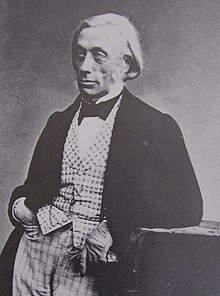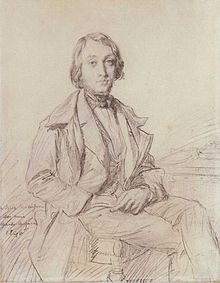| Felix Ravaisson-Mollien | |
|---|---|
 | |
| Born | 23 October 1813 Namur, France |
| Died | 18 May 1900 (1900-05-19) (aged 86) Paris, France |
| Education | Collège Rollin |
| Alma mater | University of Munich |
| Era | 19th-century philosophy |
| Region | Western philosophy |
| School | Continental philosophy French spiritualism |
| Institutions | University of Rennes |
| Main interests | Metaphysics Positive philosophy |
| Notable ideas | Criticism of French eclecticism |
Jean-Gaspard-Félix Laché Ravaisson-Mollien (French: [ʁavɛsɔ̃ mɔljɛ̃]; 23 October 1813 – 18 May 1900) was a French philosopher, 'perhaps France's most influential philosopher in the second half of the nineteenth century'. He was originally and remains more commonly known as Félix Ravaisson.
His 'seminal' 'key' work was De l’habitude (1838), translated in English as Of Habit. Ravaisson's philosophy is in the tradition of French Spiritualism, which was initiated by Pierre Maine de Biran (1766–1824) with the essay "The Influence of Habit on the Faculty of Thinking" (1802). However, Ravaisson developed his doctrine as what he called 'spiritualist realism' and 'spiritualist positivism', and – according to Ravaisson scholar Mark Sinclair – can be thought of as founding 'the school of contingency'. His most well known and influential successor was Henri Bergson, with whom the tradition can be seen to end during the 1930s; although the 'lineage' of this 'philosophy of life' can be seen to return in the late twentieth century with Gilles Deleuze. Ravaisson never worked in the French state university system, in his late 20s declining a position at the University of Rennes. In 1838 he was employed as the principle private secretary to the minister of public instruction, going on to secure high-ranking positions such as inspector general of libraries, and then the curator of classical antiquities at the Louvre. Later in his life he was appointed as the president of the jury of the Aggregation of philosophy in France, 'a position of considerable influence'. Ravaisson, was not only a philosopher, classicist, archivist, and educational administrator, but also a painter exhibiting under the name Laché.
Biography

Ravaisson was born at Namur. After a successful course of study at the Collège Rollin, he went to Munich in autumn 1839, where he attended the lectures of Schelling, and took his degree in philosophy in 1836. In the following year he published the first volume of his famous work Essai sur la métaphysique d'Aristote ("Essay on the Metaphysics of Aristotle"), to which in 1846 he added a supplementary volume. This work not only criticizes and comments on the theories of Aristotle and the Peripatetics, but also develops from them a modern philosophical system.
In 1838 he received his doctorate, his thesis entitled "De l'habitude" ("On Habit"), which was to become a classic text (a metaphysical 'poem' on nature in general apprehended through an intuitive analysis of acquired habit as a particular manifestation of its essential being, much admired by Bergson and Heidegger), and became professor of philosophy at Rennes. From 1840 he was inspector-general of public libraries, and in 1860 became inspector-general in the department of higher education. He was also a member of the Academy of Moral and Political Sciences, and curator of the Department of Antiquities at the Louvre (from 1870). He died in Paris in 1900.
Philosophical work
In philosophy, he was one of the school of Victor Cousin, with whom he was at issue in many important points. The act of consciousness, according to him, is the basis of all knowledge. Acts of consciousness are manifestations of will, which is the motive and creative power of the intellectual life. The idea of God is a cumulative intuition given by all the various faculties of the mind, in its observation of harmony in nature and in man. This theory had considerable influence on speculative philosophy in France during the later years of the 19th century.
Bibliography
Ravaisson's 'complete' 'three major' philosophical works are: Essai sur la métaphysique d’Aristote (1837 and 1846); De l’habitude (On Habit, 1838); and Rapport sur la philosophie en France au XIXeme siècle (1867). Ravaisson also produced a number of other 'noteworthy essays' such as "La Philosophie contemporaine" ("Contemporary Philosophy", 1840); "La Philosophie de Pascale" ("Pascal’s Philosophy", 1887), and "Métaphysique et Morale" ("Metaphysics and Morals", 1893). Upon his death he also 'left unfinished fragments of a major work, which were published posthumously', first as "Testament philosophique" in Revue de métaphysique et de morale ("Philosophical Testament", 1901), then later in extended form as Testament philosophique (Philosophical Testament, 1933).
| Year | Title | Original Publication Details | English Title | English Publication Details |
|---|---|---|---|---|
| 1834 | De la Métaphysique d’Aristote | Unpublished competition manuscript. Selections in De la nature à l’esprit, 2001. |
||
| 1837 | Essai sur la Métaphysique d’Aristote | Paris: Imprimerie Royale, 1837. | ||
| 1838 | De l’habitude | Sorbonne doctoral thesis (primary). Paris: H. Fournier, 1838. |
Of Habit | (1) Trans. C Carlisle & M Sinclair: Of Habit, London & New York: Continuum, 2008. (2) Updated trans. M Sinclair: Félix Ravaisson: Selected Essays, 2016, p. 31–58. |
| 1838 | Speusippi de Primis Rerum Principiis Placita Qualia Fuisse Videantur ex Aristotele | Sorbonne doctoral thesis (secondary) . Translated into French in 2012. |
||
| 1840 | "La Philosophie contemporaine: Fragments de philosophie par M. Hamilton" | in La Revue des deux mondes, 1840, p.397–427. | "Contemporary Philosophy" | Trans. J Dunham: Félix Ravaisson: Selected Essays, 2016, p. 59–84. |
| 1845 | Essai sur la Métaphysique d’Aristote | Paris: Joubert, 1845. | ||
| 1854 | De l’enseignement du dessin dans les lycées | Paris: Dupont, 1854. | "The Art of Drawing According to Leonardo da Vinci" |
Trans. M Sinclair: Félix Ravaisson: Selected Essays, 2016, p. 145–58 |
| 1856 | "Mémoire sur le Stoïcisme" | in Mémoires de l'Institut Impériale de France, Académie des Inscriptions et Belle-Lettres, vol. XXI, 1857, p. 1-94. | "Essay on Stoicism" | Trans. A Efal and M Sinclair: Félix Ravaisson: Selected Essays, 2016, p. 85-144. |
| 1867 | La Philosophie en France au XIXème siècle | Paris: Hachette, 1867. | ||
| 1871 | Venus de Milo | Paris: Hachette, 1871. | ||
| 1875 | Les classiques de l'art: modèles pour l'enseignemnet du dessin | Paris: Rapilly, 1875 | ||
| 1880 | "Les monuments funéraires des Grecs" | in Revue politique et littéraire. Revue blue, 10 April 1880, vol. XVIII, p. 963-70. | "Greek Funerary Monuments" | Trans. M Sinclair: Félix Ravaisson: Selected Essays, 2016, p. 229-242. |
| 1882 | "L'enseignement du dessin d'après M. F. Ravaisson" | in Dictionnaire de pedagogie et d'instruction primaire Vol. 1, 1882; Paris: Hachette, p. 671-84. | "On the Teaching of Drawing" | Trans. T Viola and M Sinclair: Félix Ravaisson: Selected Essays, 2016, p. 159-188. |
| 1887 | "La Philosophie de Pascale" | in La Revue des deux mondes 80, 1887, p. 399–428. | "Pascal’s Philosophy" | Trans. M Sinclair: Félix Ravaisson: Selected Essays, 2016, p. 253–78. |
| 1892 | "Les mystères. Fragment d'une étude sur l'histoire des religions" | in Revue politique et littéraire. Revue blue, 19 March 1892, p. 362-6. | "Mysteries: Fragment of a Study of the History of Religion" | Trans. M Sinclair: Félix Ravaisson: Selected Essays, 2016, p. 243-252. |
| 1892 | La Venus de Milo | in Mémoires de l'Académie des Inscriptions et Belle-Lettres, vol. XXXIV, Part 1, 1892, p. 145-256. also as off-prints by Klincksieck: Paris, 1892. |
"Venus de Milo" |
Trans. M Sinclair: Félix Ravaisson: Selected Essays, 2016, p. 189-228. |
| 1893 | "Métaphysique et morale" | in Revue de métaphysique et morale 1, 1893, 6–25. | "Metaphysics and Morals" | Trans. M Sinclair: Félix Ravaisson: Selected Essays, 2016, p. 279–94. |
| 1901 | "Testament philosophique" | Ed. Xavier Léon in Revue de métaphysique et de morale 9/1, 1901, p. 1–31. | ||
| 1933 | Testament philosophique | Ed. Charles Devivaise. Paris: Boivin, 1933. | "Philosophical Testament" | Trans. J Dunham and M Sinclair: Félix Ravaisson: Selected Essays, 2016, p. 295–336. |
Notes
| ||||
References
Notes
- ^ Sinclair (2019), p. 1
- ^ Sinclair (2016), p. 1
- Carlisle (2010), p. 125
- ^ Grosz (2013), p. 219
- Sinclair (2019), p. 9–10
- ^ Sinclair (2019), p. 7
- ^ Sinclair (2019), p. 8
- Sinclair (2019), p. 9
- ^ Chisholm 1911.
- ^ Sinclair (2019), p. 6
- Carlisle & Sinclair (2008), p. 4-5
- ^ Carlisle & Sinclair (2008), p. 5
- ^ Sinclair (2016), p. vii
- Sinclair (2016), p. 2-3
- ^ Sinclair (2019), p. xi
- ^ Sinclair (2016), p. vi
- Carlisle & Sinclair (2008), p. 1-21; 78-114
- Carlisle & Sinclair (2008), p. 20
- Ravaisson, Félix (2012). "Ravaisson, la doctrine de Speusippe sur les premiers principes selon le témoignage d'Aristote". Cahiers Philosophiques (2): 68–96. doi:10.3917/caph.129.0068. Retrieved 2020-04-05.
- Sinclair (2016), p. 8-9
- Sinclair (2016), p. 3-4
- Sinclair (2016), p. 25
- ^ Sinclair (2016), p. 11-12
- ^ Sinclair (2016), p. 27
- Sinclair (2016), p. 10-11
- Sinclair (2016), p. 11
- Sinclair (2016), p. 13-15
- ^ Sinclair (2016), p. 15-18
- Sinclair (2016), p. 28
- Sinclair (2016), p. 12-13
- Sinclair (2016), p. 18
- Sinclair (2016), p. 12
- Sinclair (2016), p. 19-20
- Sinclair (2016), p. 18-19
- Sinclair (2016), p. 20-21
- Sinclair (2016), p. 21-22
Sources
Primary
- Sinclair, Mark. Being Inclined: Félix Ravaisson’s Philosophy of Habit (Oxford: Oxford University Press, 2019)
Secondary
- Carlisle, Clare. "Between Freedom and Necessity: Félix Ravaisson on Habit and the Moral Life", in Inquiry (43/2: 2010), p. 123–45
- Carlisle, Clare and Mark Sinclair. "Editors’ Introduction" and "Editors’ Commentary" in Félix Ravaisson Of Habit, translation, introduction, and commentary by Clare Carlisle and Mark Sinclair (London/New York: Continuum, 2008), p. 1-21; 78-114
- [REDACTED] This article incorporates text from a publication now in the public domain: Chisholm, Hugh, ed. (1911). "Ravaisson-Mollien, Jean Gaspard Félix". Encyclopædia Britannica. Vol. 22 (11th ed.). Cambridge University Press. p. 922.
- Grosz, Elizabeth. "Habit Today: Ravaisson, Bergson, Deleuze and Us", in Body and Society (19/2–3: 2013), p. 217–39
- Malabou, Catherine. "Addiction and Grace: Preface to Félix Ravaisson’s Of Habit" in Félix Ravaisson Of Habit, translation, introduction, and commentary by Clare Carlisle and Mark Sinclair (London/New York: Continuum, 2008), p. vii-xx
- Sinclair, Mark. "Introduction" in Félix Ravaisson: Selected Essays, edited by Mark Sinclair; translated by Jeremy Dunham, Adi Efal, Mark Sinclair, Tullio Viola (London: Bloomsbury, 2016), p. 1-29
- 1813 births
- 1900 deaths
- 19th-century French educators
- 19th-century French essayists
- 19th-century French male writers
- 19th-century French painters
- 19th-century French philosophers
- Action theorists
- Aristotelian philosophers
- Classicism
- Commentators on Aristotle
- Continental philosophers
- French epistemologists
- French archaeologists
- French art historians
- French classical scholars
- French essayists
- French ethicists
- French male non-fiction writers
- French male painters
- French historians of philosophy
- Metaphysicians
- Ontologists
- People from Namur (city)
- French philosophers of art
- French philosophers of culture
- French philosophers of education
- French philosophers of history
- Philosophers of mind
- Philosophers of psychology
- Philosophers of social science
- French philosophy academics